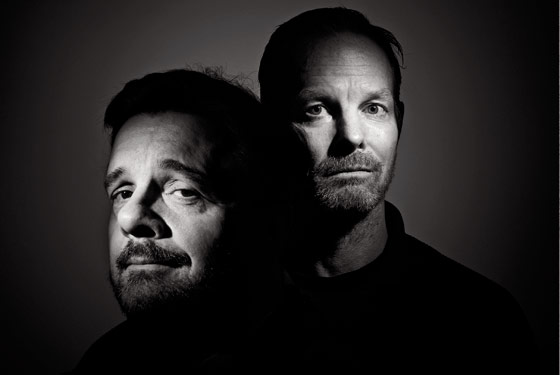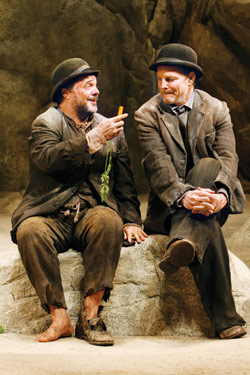
Samuel Beckett’s Waiting for Godot is notorious for its split personality—a howl in the wilderness and a buddy comedy, owing as much to Buster Keaton as to the notion that every man is alone in the universe. So while the West End currently features a knight (Ian McKellen) and an O.B.E. (Patrick Stewart) in the roles of the homeless tramps, Broadway went the other way, with two infamous clowns: Bill Irwin, veteran of the Pickle Family Circus (as well as a recent Tony-winning turn in Who’s Afraid of Virginia Woolf?), plays Vladimir; Nathan Lane, Tony-winning star of The Producers, among other musical comedies, plays Estragon. (The production also features John Goodman and John Glover.) Godot’s U.S. premiere in Miami Beach in 1956 failed miserably after being billed “The Laugh Sensation of Two Continents,” but times change, and this production fully embraces the comedy within the tragedy. Lane and Irwin do know their way around some silly banter, and yet they are dead serious about a play they’ve long revered.
[To Irwin] Is it true you have a trampoline in your dressing room?
BILL IRWIN: That doesn’t really describe it. It’s more a little pad that allows you to jog in place.
NATHAN LANE: I thought we were going to hear about bedroom antics. You still have the trampoline and the mirror over the bed?
BI: We have some old photographs of that.
NL: Yes, I saw them on YouTube.
The production is in the old Studio 54. Did either of you go dancing here?
NL: I went once. It was a birthday party for Eddie Murphy. All I remember is that it was very dark, and I didn’t feel comfortable, and at one point I walked into a table and knocked over a bottle of Champagne, and this very large man stood up, and it was like a scene from a silent film. I said, “Oh, I’m sorry,” and he said, “You’ll be paying for that.” And so it wound up costing me a couple of hundred bucks.
BI: It confirms me in my decision not to have ever gone.
So which of you first wanted to make Waiting for Godot happen?
BI: After doing Virginia Woolf, I made a pest of myself going around saying, “What about Waiting for Godot? And people would tend to nod, but it was a hard thing to bring it to fruition. When it became a conversation with [Roundabout artistic director] Todd Haimes, Todd lit up. He said, “The Roundabout has never done a Beckett play of any kind.”
NL: The moment they said Bill was involved, I said yes, absolutely. A long time ago, we had discussed doing this play.
Together?
NL: No, we were urging each other to do it with other people. Yes, we wanted to do it together!
I’ve read that you put up a scene from Godot in high school.
NL: Well, for some reason I felt compelled to do it in the high-school cafeteria. Another student and I did a scene from Godot and a scene from Inherit the Wind.
BI: Dig those choices!
NL: We did the “All the dead souls” section, and they were very quiet. No screams of “You suck” from the back.
Were they eating at the time?
NL: No, it wasn’t dinner theater. As a kid, I loved Godot because of the poetry and the humor and the strangeness, but then as you get older, it’s much more resonant. It’s not so absurdist. I realize that these are the conversations I have every day. “What do we do now?” “Let’s go, yes.” “Did that all happen yesterday?”
BI: Actors tend to be haunted by this play in one direction or the other. Either they have no desire ever to have anything to do with it, or it’s on your list of things that drive you.
NL: Yeah, the number of people who tell you “I hate that play,” or they threaten you with “I might come, because of you, but I don’t know.” Elaine Stritch said to me, “Oh, Nathan, if that play isn’t funny, it’s one long fucking night in the theater.”
There’s a lot of physical comedy in Godot—something you both have decades of experience with.
NL: I think the trick is, we’re entertaining each other. We’re playing little games to fill the time, to block out all the dead voices. What is the song in Zorba? Life is what you do when you’re waiting to die.
BI: This is my two cents’ worth: Any great play is a physical play. Virginia Woolf is just tons of text, and there isn’t much active stage direction. Same with this in some ways, but there are flashes of violence or physical action that are essential to the story.

[To Lane] How does this compare to your other famous buddy comedy?
NL: It’s a team, and in The Producers it was a team. That was a father-son relationship, taking him under my wing and corrupting him. This one is a kind of marriage; they bicker like a couple, but they need each other. If you’re talking about chemistry, that’s just either there or it isn’t. We’ve been told we work well together.
So would Bill be a good companion in an existential wasteland of relentless tedium?
NL: Yes, absolutely, or Joan Rivers. I find her endlessly amusing. But yes, Bill is a very good partner to have in an existential wasteland.
Like, for instance, being on the same stage night after night, repeating the same lines?
NL: Sure, absolutely, that’s an analogy. As much as you love something, there’s still going to be days where you go, “I can’t go on like this!” And you do go on, because that’s your job.
BI: My God, the number of audiences that each of us has stepped in front of! But it’s particular each time. If you start getting slick and saying, “I know how to work the house … ”
NL: Who’s that guy? He would be no fun. In this play, you really can’t count on anything. Every audience has a different reaction. Sometimes it’s nervous laughter, sometimes they’re just uncomfortable. But I would hope that people would come with an open mind. If you’ve heard that it’s like homework or castor oil, you should probably stay home and watch 24.
Why all of a sudden all this raw, difficult work on Broadway?
NL: It’s a healthy season. People are maybe taking more risks because of the economy.
And it’s also relatively cheap to do.
BI: Cheaper than a musical, but not without risks.
NL: You’re not doing Send Me No Flowers. It is Waiting for Godot.
[To Irwin] Your next job couldn’t be further from Godot: You’ll be playing Harry McAfee in a Roundabout production of Bye Bye Birdie this fall.
BI: Godot turned out to be—and Nathan agrees with me on this—the hardest thing either of us has done. And so I’m counting on Birdie to be easier: I sure hope it will be. But then I also realize you can’t count on anything; I didn’t think Godot would be this hard.
